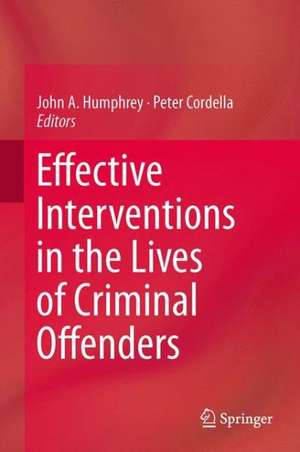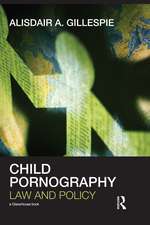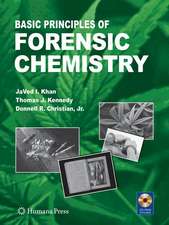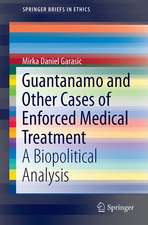Effective Interventions in the Lives of Criminal Offenders
Editat de John A. Humphrey, Peter Cordellaen Limba Engleză Hardback – 24 oct 2013
This comprehensive book considers all three sources of turning points—structural location, human agency, and situated choice—across the life course of criminal offenders. The book also provides a section on cross-cultural perspectives on the effectiveness of interventions in the careers of criminal offenders.
The policy implications of each intervention are considered in individual chapters. In addition, the authors suggest a research agenda to further the understanding of the interplay among the key interventions across the life course. This book will be of interest to researchers studying criminology from a life course perspective, as well as crime prevention, and public policy.
| Toate formatele și edițiile | Preț | Express |
|---|---|---|
| Paperback (1) | 634.18 lei 6-8 săpt. | |
| Springer – 23 aug 2016 | 634.18 lei 6-8 săpt. | |
| Hardback (1) | 640.24 lei 6-8 săpt. | |
| Springer – 24 oct 2013 | 640.24 lei 6-8 săpt. |
Preț: 640.24 lei
Preț vechi: 753.22 lei
-15% Nou
Puncte Express: 960
Preț estimativ în valută:
122.51€ • 133.49$ • 103.23£
122.51€ • 133.49$ • 103.23£
Carte tipărită la comandă
Livrare economică 23 aprilie-07 mai
Preluare comenzi: 021 569.72.76
Specificații
ISBN-13: 9781461489290
ISBN-10: 1461489296
Pagini: 168
Ilustrații: XVII, 149 p. 2 illus.
Dimensiuni: 155 x 235 x 13 mm
Greutate: 0.41 kg
Ediția:2014
Editura: Springer
Colecția Springer
Locul publicării:New York, NY, United States
ISBN-10: 1461489296
Pagini: 168
Ilustrații: XVII, 149 p. 2 illus.
Dimensiuni: 155 x 235 x 13 mm
Greutate: 0.41 kg
Ediția:2014
Editura: Springer
Colecția Springer
Locul publicării:New York, NY, United States
Public țintă
ResearchCuprins
Part 1: Structural Location.- Marriage as an Interventionacross the Life Course.- Patterns of Unemployment and Desistance from Crime.-Part 2: Situational Context.- Criminal Victimization and Criminal Desistance.-Intervetions in Gang-Related Criminal Activity.- Interventions among Ex-Convicts.-Part 3: Human Agency.- Identity Theory and Criminal Desistance.- CognitiveTransformation and Changes in Criminal Behavior.- The Internal Narrative ofDesistance.- Part 4: Cross-Cultural Interventions.- Cross-Cultural Perspectiveson Criminal Interventions.- The Effectiveness of Marriage as an Intervention inthe Netherlands.- Work and Criminal Desistance in a Nordic Welfare State.-Epilogue: Policy Implications and Research Recommendations.
Notă biografică
John Humphrey is a Professor of Criminal Justice at St. Anselm College in Manchester, New Hampshire. Dr. Humphrey received his PhD in Sociology from the University of New Hampshire in 1973. His research interests include wrongful conviction, deviant behavior and social control, police and society, and global crime and justice. He has worked on several federally-funded grant projects on gun-related criminal behavior, a life-course analysis of felony parolees, and the efficacy of restorative justice. Peter Cordella is a Professor of Criminal Justice at St. Anselm College in Manchester, New Hampshire. He received his PhD in Sociology from Boston University on 1985. His main research interests are theories of crime, models of social control, comparative criminal justice systems, violence studies and white collar crime.
Textul de pe ultima copertă
This book provides the most current thinking on effective interventions in the lives of criminal offenders. Original articles by leading criminologists provide in-depth analyses of “turning points” in the desistance process experienced by criminal offenders. An understanding of the sources of turning points (or interventions) across the life course is vital to assessing their impact on criminal behavior. Three sources of interventions in criminal careers are identified in the literature: structural location, human agency and situated choice. Structural location refers to the social place occupied by an individual in the social structure: including marital and occupational status, education and income, and so on. Human agency means the active will of an individual to change his or her behavior, that is, the decision to stop engaging in criminal activities. In addition, situated choice coordinates the offender’s willingness to end a life of crime with the social structural supports that increase the odds of criminal desistance.
This comprehensive book considers all three sources of turning points—structural location, human agency, and situated choice—across the life course of criminal offenders. The book also provides a section on cross-cultural perspectives on the effectiveness of interventions in the careers of criminal offenders.
The policy implications of each intervention are considered in individual chapters. In addition, the authors suggest a research agenda to further the understanding of the interplay among the key interventions across the life course. This book will be of interest to researchers studying criminology from a life course perspective, as well as crime prevention, and public policy.
This comprehensive book considers all three sources of turning points—structural location, human agency, and situated choice—across the life course of criminal offenders. The book also provides a section on cross-cultural perspectives on the effectiveness of interventions in the careers of criminal offenders.
The policy implications of each intervention are considered in individual chapters. In addition, the authors suggest a research agenda to further the understanding of the interplay among the key interventions across the life course. This book will be of interest to researchers studying criminology from a life course perspective, as well as crime prevention, and public policy.
Caracteristici
Provides a theoretical framework for understanding effective interventions in the lives of criminal offenders Examines recent innovations in effective intervention strategies Studies the long term effects of marriage in the lives of criminal offenders Includes supplementary material: sn.pub/extras

















